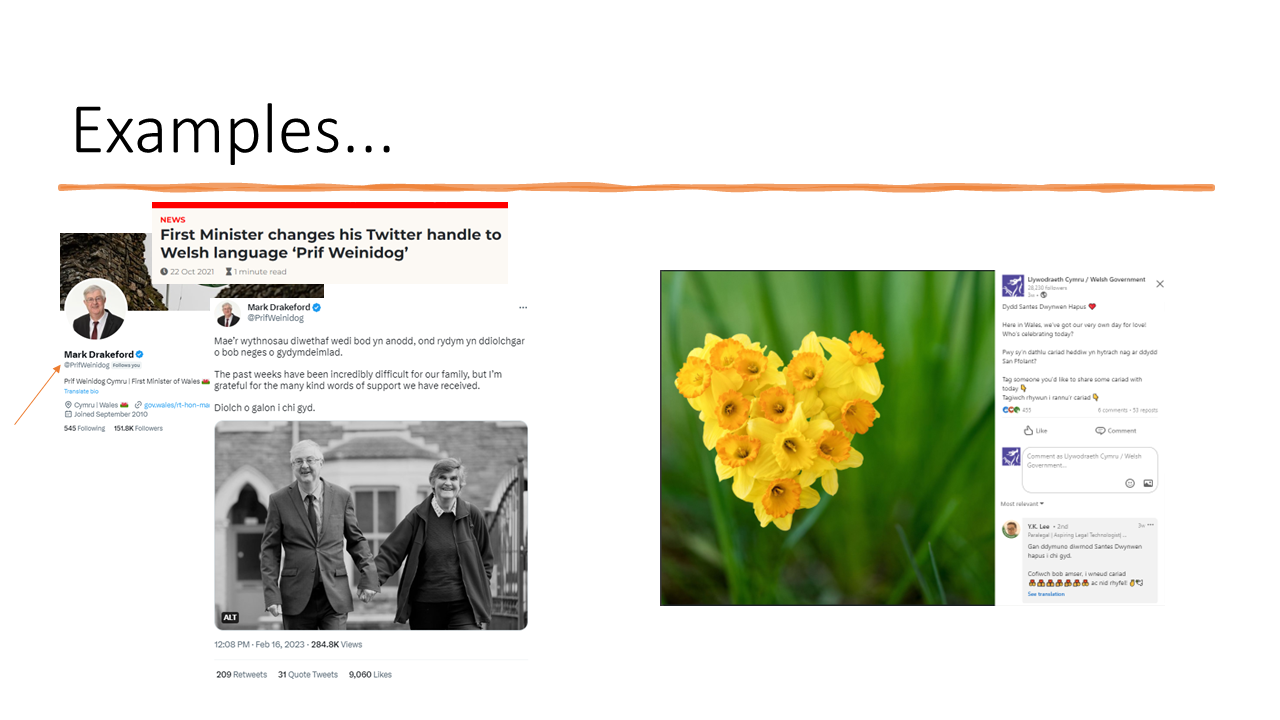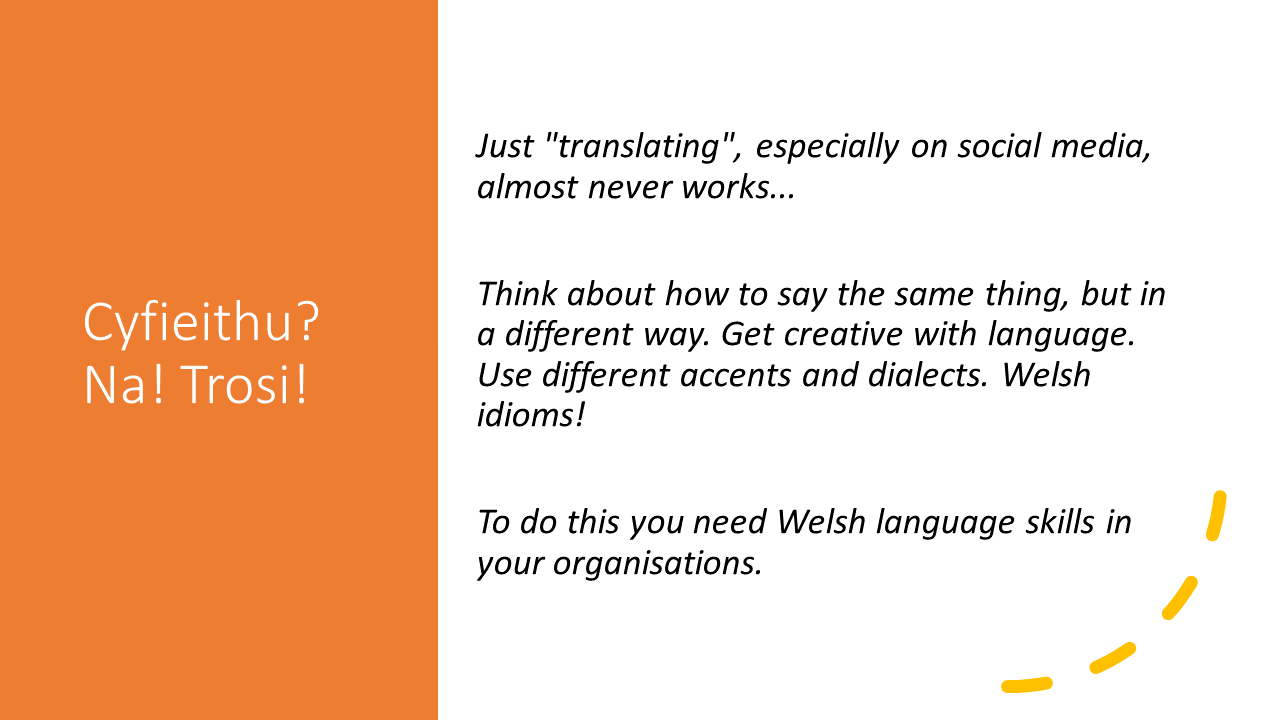Laura Truelove runs the Welsh Government’s social media channels alongside her team and has experience of working in this area throughout the pandemic and several major events and crises. She shares some tips about communicating bilingually on social media.
Is compliance enough?
 Anyone who works in the public sector in Wales will be familiar with the Welsh Language (Wales) Measure 2011. It says that we (public sector bodies) must not treat the Welsh language less favourably than English. This applies across all our communications, including social media, and the Welsh Language Commissioner oversees this to ensure we are compliant. But is compliance enough when it comes to bilingual communications and reaching our language goals?
Anyone who works in the public sector in Wales will be familiar with the Welsh Language (Wales) Measure 2011. It says that we (public sector bodies) must not treat the Welsh language less favourably than English. This applies across all our communications, including social media, and the Welsh Language Commissioner oversees this to ensure we are compliant. But is compliance enough when it comes to bilingual communications and reaching our language goals?
The Measure was developed to ensure public sector bodies prioritise and promote the Welsh language, and to provide Welsh speakers with rights to access services in our mamiaith (mother-tongue). While there are some black and white rules in terms of providing bilingual services, such as ensuring documents are available in both languages, we don’t want to fall into a trap of just copying and pasting or producing poor translations. To double the daily use of Welsh and reach the Welsh Government’s ambition of one million Welsh speakers, we must think beyond compliance.
Two channels or one?
When it comes to bilingualism on social media, often one of the biggest debates is whether to have one bilingual account, or two separate ones for different languages. There are clearly pros and cons to each approach.
Having one bilingual page allows you to creatively blend English and Welsh, which can send a strong message that your organisation or brand is committed to Cymraeg. It also allows you to experiment with bilingual usernames and handles (for instance, @prifweinidog for the first minister or @cymru for Wales’ football team). However, when posting bilingually, it’s important to think about the social media algorithm. Writing too much Welsh at the beginning of your post can make people who don’t speak Welsh disregard or scroll past the post. And doing two separate posts, one after another, can have a negative impact on the reach of those posts.

Here are some examples of bilingual communications from the Welsh Government, including the @prifweinidog Twitter account and Welsh Government’s LinkedIn.
There are also many benefits to having two separate pages. A Welsh-only page allows you to create unique Welsh-only content and speak directly to your Welsh-speaking audience in a style, as well as a language, they’ll better understand. It’s also easier to get to know your followers when they are separated in this way, because you can easily delve into the analytics for each audience and tailor your content to increase engagement.
Whichever way you choose to set up your channel, the most important thing will be treating the Welsh with the respect it deserves. This means doing everything you can to include Welsh on all your pages, in the bio, in the link, etc. The more you can inject into your posts and videos on social media the better, as this will increase the exposure of the language.
Does translating work?
Directly translating English into Welsh rarely works as expected, especially for social media. Why? Because it ignores the many wonderful accents, idioms and sayings contained in Welsh. The Welsh language may be the oldest language in the UK, but it is very much alive and thriving and adding new words and phrases all the time. Simply translating from English denies us all that history and energy. Rather than just translating, we should aim to trosi or transpose English to Welsh. In practice this means saying the same thing, but in a different way; a way that has been re-written and re-purposed with a Welsh-speaking audience in mind.

With limited money and resources, this can be easier said than done. From copywriting to filming, there’s already significant demands on social media managers – and all communications professionals – to be multi-skilled. But to increase the use of Welsh, we must develop these language skills within our organisations and employ those who have them.
This is not to say us Welsh speakers can sit back and relax. Far from it. We have a responsibility to support others in this endeavour. In practice this could mean something as simple as helping colleagues with text-checking work. In our team we’ve created a Teams chat which contains most people in our department, where we can check each other’s Welsh and discuss different ways to communicate. While Bing Translator, Cysill and Cysgeir are all essential tools for communicating in Welsh, you should always have a human Welsh speaker (or two!) to text-check your work.
Just because the Welsh Language Measure doesn’t apply to your business or third sector organisation, doesn’t mean you shouldn’t be looking to increase your use of Welsh. We need everyone on board to help in our nation’s endeavour to increase the use of the language. Helo Blod is an excellent, free service that can help you with translation. The Welsh Language Commissioner’s Office also run sessions to help with practical steps to increase your use of Welsh.
Dyfal Donc a Dyr y Garreg!
Regardless of your level of Cymraeg, we’re all on our own personal development journey. Despite working through the medium of Welsh all my life, I recently went to Nant Gwrtheyrn for a week-long Gloywi Iaith residency to brush up on my skills. Since then, I’ve felt more confident than ever in my ability to write, and communicate to others, in Welsh. I highly recommend it.
There are many excellent examples from across Wales of different organisations using social media to promote Cymraeg and using Cymraeg to promote their organisation. I think we’re all doing an excellent job. And this was echoed at a social media conference I attended in Dublin, where I was really heartened to learn they are looking to Wales as a paragon of best practice.
While it may be daunting, these efforts will be noticed and appreciated by your audience. Amdani!
Laura Truelove is a senior digital manager at Welsh Government